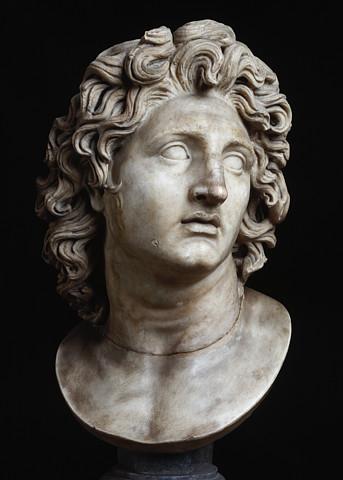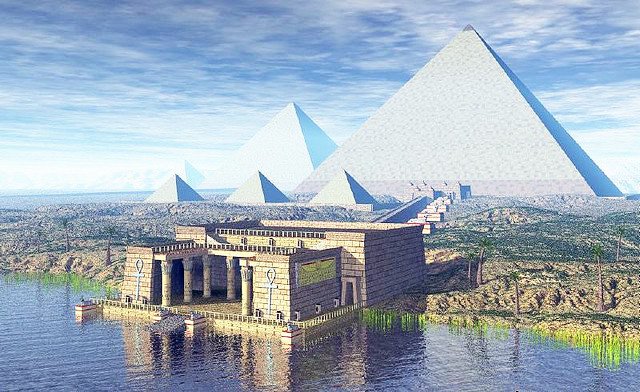ALEXANDER THE GREAT IN EGYPT
A POLITICAL AND RELIGIOUS REVOLUTION
THE CREATION OF A GOD KING

In this article we are going to talk about a defining person in world history. We are going to talk about Alexander the Great. Now unlike what you may have been taught in History class, ancient Athens and Sparta were not major super powers in the ancient world. They were city states. And the city state of Athens fell apart after the imperialistic blunders of Pericles during the Peloponnesian War. What was a super power in the ancient world was the empire of Persia, which was a geopolitical colossus of the first order, stretching from the Mediterranean to the Himalayan Mountains in what is today India and Pakistan.
Now after the Peloponnesian War, Athens and Sparta had both been severely weakened. So it was actually a state on the periphery of Greek civilization, (a state considered to be "country bumpkins" by many of Athen's elite) that ended up taking over the whole of Greece. We are talking about the state of Macedon.
Now normally it would've just stopped there and you would've had a new set of masters for Greece, except for the arrival on the stage of history one of the most extraordinary as well as one of the most brutal military geniuses in history, Alexander the Great. Alexander the Great decided to take on the Persian empire, which at the time seemed almost improbable considering the size of his military resources vis-à-vis the Persian military. But he did not listen to those who told him he couldn't do it, and he eventually conquered Persia in a series of brilliant military victories.
This article is not going to be an extensive biography of everything that Alexander the Great did in his lifetime. What we would like to focus on is Alexander's time in Egypt. His experience in Egypt led to a series of strange and fascinating events, where he was declared a God-King, and the living son of God by the Oracle at Ammon at the Siwa Oasis.
ALEXANDER THE GREAT ARRIVES IN EGYPT
AND IS MADE PHARAOH

In 332 B.C, Alexander the Great arrived with his armies in Egypt after winning a set of stunning military victories against the Persians. In particular was the Battle of Issus (in what is modern day Turkey), that had resulted in the fleeing of King Darius III from the battlefield. Many historians (such as Arrian) state that this battle marked the beginning of the end for the Persians, and the rise of Hellenic power.
Arrian states the following about Alexander's arrival in Egypt:
"Alexander now led an expedition into Egypt, whither he had set out at first (from Tyre); and marching from Gaza, on the seventh day he arrived at Pelusium ' in Egypt. His fleet had also set sail from Phoenicia to Egypt ; and he found the ships already moored at Pelusium.When Mazaces the Persian, whom Darius had appointed viceroy of Egypt ascertained how the battle at Issus had resulted, that Darius had fled in disgraceful flight, and that Phoenicia, Syria, and most of Arabia were already in Alexander's possession, as he had no Persian force with which he could offer resistance, he admitted Alexander into the cities and the country in a friendly [manner]." (Arrian)
When Alexander arrived in Egypt with his armies, Mazaces simply handed over the treasury's 800 talents and all the "royal furniture." In return, Mazaces was kept as part of the new administration.
According to the historian Siculus, Alexander also received a friendly reception by the Egyptian people themselves, because they had not been treated very well by the Persians.
"Alexander marched on to Egypt and secured the adhesion of all its cities without striking a blow. For since the Persians had committed impieties against the temples and had governed harshly, the Egyptians welcomed the Macedonians (Siculus)."
In fact, he was even crowned Pharaoh of Egypt in in Memphis on November 14, 332 B.C. They gave him the crown of Upper and Lower Egypt, and named in the incarnation of Ra and Osiris.
From what we can tell in historical accounts, Alexander seemed to be very open to Egyptian religion and traditions. Arrian says the following about his stay in Egypt:
"[Alexander] crossed the stream and came to Memphis; where he offered sacrifice to Apis and the other gods, and celebrated a gymnastic and musical contest, the most distinguished artists in these matters coming to him from Greece (Arrian)."
While in Egypt, Alexander also attended a lecture by the philosopher Psammon.
"It is also said that while he [Alexander] was in Egypt he attended a lecture by the philosopher Psammon, and was particularly ready to accept his argument that, since the ruling and dominant part of anyone is divine, it follows that all men are ruled by god. However, the story goes on, he himself had an even better and more philosophical idea on this matter, when he said that while god is the common father of all men, he regards men of exceptional virtue as peculiarly his own (Plutarch)."
ALEXANDER'S FOUNDING OF ALEXANDRIA

After the conquest of Egypt, Alexander had a desire to found a populous Greek city and name it after himself. Plutarch says the following about the founding of Alexandria:
"On the advice of his chief engineers he already had a site more or less measured out and enclosed, but then one night while asleep he had an amazing dream in which a distinguished-looking man with a good head of grey hair came up to him and quoted the following lines: 'There is a certain island in the restless, churning sea. Lying before Egypt: Pharos is the name men give it.' So he got up straight away and went to Pharos, which in those days was still an island a little north of the Canobic mouth of the Nile...When he saw the place — a spit of land like a moderately wide isth-mus between a large lake and the sea, which ends in a large natural harbour — he appreciated its exceptionally favorable situation and declared that Homer had turned out to be as clever an engineer as he was remarkable in other fields; and he commanded his designers to draw up the plans for the city, making it conform to the topography of the place...Their royal master was delighted with the design, but suddenly a vast number of birds from the river and lake, of all kinds of sizes — so many that it was as if a cloud passed across the sky — swooped down on to the place and devoured every last grain of barley. Even Alexander found this omen disturbing, but the diviners told him there was no cause for alarm, because the city founded here by him would be self-sufficient to a very high degree and would supply the needs of all kinds of men, so he told his overseers to get on with the work (Plutarch)."
Apparently this omen would come true, because not only would Alexandria become a well-populated city, but its library would become the intellectual center of the ancient world, and the giant lighthouse at Pharos, Alexandria, would become one of the seven wonders of the ancient world.
Arrian also says that Alexander made sure that there would be places allocated for temples to both Greek and Egyptian gods:
"[Alexander] himself marked out the boundaries of the city, pointing out the place where the agora was to be constructed, where the temples were to be built, stating how many there were to be, and to what Grecian gods they were to be dedicated, and specially marking a spot for a temple to the Egyptian Isis. He also pointed out where the wall was to be carried round it. In regard to these matters he offered sacrifice, and the victims appeared favourable (Arrian)."
ALEXANDER IS PRONOUNCED THE SON OF GOD
BY THE ORACLE OF AMMON AT THE OASIS OF SIWA

One of the stranger events in Alexander's stay in Egypt was his journey to the temple of Ammon at the Oasis of Siwa. He had a desire to go to this temple because the Oracle of Ammon was said to be exact in its information, and Perseus and Hercules were said to have consulted it (Arrian). In addition to having a desire to emulate Perseus and Hercules, he also was interested in his own pedigree. Just as Perseus and Hercules were the son of Gods, he also believed that this was his situation.
However, if you understand the geography of ancient Egypt, this was a mind-boggling decision. The Oasis of Siwa is very hard and dangerous to get to. You have to travel along the coast. Then you travel across one of the most barren parts of the Sahara desert to this oasis.
Plutarch said the following about why the trip to the oasis of Siwa was dangerous:
"There are two reasons why the journey is dangerous: the first is the unavailability of water, which means that the route actually passes through desert for quite a few days, and the second is the possibility of a fierce south wind descending on travelers as they are passing over an immense area of deep sand. This, of course, is the wind which, in the famous story from long ago about Cambyses's army" (a Persian army that set out in 524 B.C. to supposedly destroy the temple), "whipped up a huge heap of sand until the plain was a surging sea, buried 50,000 men, and killed them. Almost everyone else took this into consideration, but it was never easy to get Alexander to change his mind once he had decided on a course of action. By yielding to his assaults, Fortune had strengthened his determination, and his passionate nature boosted his ambition until he became invincible against things. And not only his enemies, but even places and opportunities succumbed to his will (Plutarch)."
When Alexander made this journey, he left most of his army in Egypt, while taking a few friends, companions and guides. Now when Alexander made this journey, his party ran out of water after four days, according to Siculus. But then Siculus says the group was saved by a great storm of rain from the heavens, a rescue that he said seemed to have happened by "divine providence."
On Alexanders troubles in the desert, Plutarch wrote:
"At any rate, the help he luckily received from the god during this journey when the going was difficult has met with more credence than the oracles the god subsequently delivered — or rather, in a sense, the oracles had gained credibility because of these lucky events. In the first place, heavy rain and persistent showers from Zeus not only relieved them of the fear of thirst, but also smothered the dryness of the sand until it became moist and compact, and so cleared the air and made it easy to breathe. Again, when the markers which the guides were following were obliterated, and the travellers were wandering aimlessly around and getting separated from one another in their ignorance of which way to go, some crows appeared and took on the role of expedition leaders: they would fly swiftly ahead as long as the party stayed with them, and would wait for them if the others fell behind and slowed down. But the most astonishing thing, as reported by Callisthenes, is that the birds used their cries to recall any members of the party who went astray during the night, and cawed until they had got them back on to the tracks left by the rest of the party in its journey (Plutarch)."
Eventually Alexander and his party did make it to the temple, and they were greeted with a very warm reception.
Plutarch says that according to his sources, Alexander was met by the Siwan high priest who greeted him with the words "O, paidion", "Oh, my son", but mispronounced the Greek as "O, pai dios" meaning "Oh, son of god", much to Alexander's delight and amazement. (Plutarch).
Plutarch also said the following about Alexander's visit to the temple:
"Once he had passed through the desert and reached his destination, the prophet of Ammon gave him the god's greetings in terms implying that the god was his father. When Alexander asked whether any of his father's assassins had escaped him, the spokesman told him not to speak such sacrilegious words, because he had no mortal father, so Alexander changed his question and asked whether he had punished all of Philip's assassins. Then he turned to his empire and asked whether it was god's will that he should rule over the whole world. The god replied that such was his will, and that Philip had been paid the full quota of justice, and Alexander presented the god with magnificent offerings and the men with money."
There were also apparently some prophesies that would remain a secret.
"This is the account most writers give of the god's prophecies, but Alexander himself in a letter to his mother says that he received some secret oracles which he would tell her and her alone when he returned (Plutarch)."
ALEXANDER THE GREAT LEAVES THE HELLENISTIC WORLD AS HIS LEGACY
AND HIS GENERAL PTOLEMY ESTABLISHES A DYNASTY IN EGYPT THAT WOULD LAST UNTIL ROMAN CONQUEST
Alexander the Great was successful in creating an empire that stretched from Ancient Greece to Pakistan and Afghanistan. However, while he was a great conqueror, he was not so good at succession planning. When asked who he would leave this great, sprawling empire to, the story goes that he said, "To the strongest!" As a result, when he died at the young age of 32, his empire quickly split into four different empires under Alexander's generals. And the province of Egypt went to his general Ptolemy, who would found a dynasty that would last all the way until the death of Queen Cleopatra.
While Alexander's physical empire did not remain intact, he had successfully spread the cultural legacy of Greece throughout the ancient world. He had transformed Greece from the polis to the cosmopolis.
RELATED LINKS
ANCIENT HISTORICAL SOURCES ONLINE
Plutarch: The Life of Alexander
The Library of History of Diodorus Siclus
OTHER ONLINE SOURCES
Alexander the Great in Egypt (Tour Egypt)
Alexander in the Oasis of Siwa (Greece)
Siwa Oasis (Wikipedia)
Alexander Visits Siwa (Livius)
Temple of Amun, Siwa Oasis, Egypt (Places of Peace and Power)
BOOKS
Hellenistic Lives: Including Alexander the Great, by Plutarch (Google Books)
The Correspondence Between Aristotle and Alexander the Great (Google Books)
Alexander the Great, Son of the Gods (Google Books)